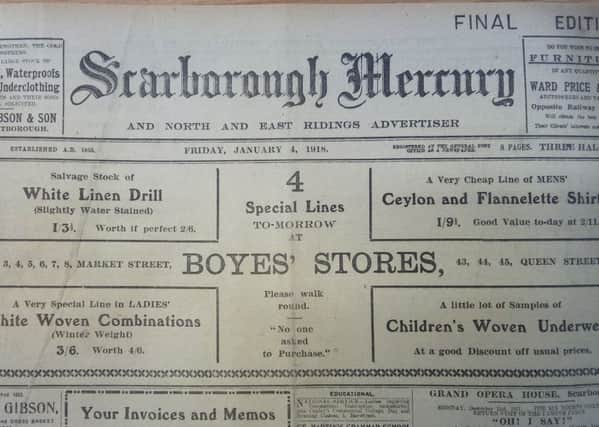1918 Court: Wife unlawfully sells husband's furniture


Mr WJ Stuart appeared for plaintiff and Mr JB Black for the defendant.
Mr Stuart said the plaintiff’s case was that defendant bought the furniture from plaintiff’s wife and then subsequently sold it on his own behalf. Plaintiff’s case was that his wife had no authority to sell. The facts of the case were, to a certain extent, of a very distressing nature. Plaintiff joined the Army in November, 1914, and lived at Bridlington in North View Terrace. Up to that time the relations between Mr and Mrs Kidd were perfectly happy in every respect. Plaintiff went out in Egypt, Salonica, and Palestine until January, 1918, when, owing to certain facts which came to his knowledge of a domestic character he got special leave and came to make enquiries. Since he came home he had been in hospital suffering from malaria.
His Honour: When did he come home?
Advertisement
Hide AdAdvertisement
Hide AdMr Stuart: He came home in January of last year. Up to about May, 1917, there was regular correspondence between husband and wife, but after May, 1917, Mrs Kidd did not hear anything for some months. As a matter of fact plaintiff had been in hospital and he thought that letters had probably miscarried. Subsequently, later in the summer, he got a letter from his wife asking for his forgiveness. He did not know why she wanted it, and this was the first intimation that plaintiff had that anything was wrong. Plaintiff found out that his wife had removed from 3, North View Terrace, to another house in Bridlington, in Nelson Street. While there Mrs Kidd got under the influence of another man, who was a stranger to Bridlington. He reported himself as a discharged soldier and got Mrs Kidd’s sympathy in that way. At all events about July, 1917, he persuaded Mrs Kidd to leave Bridlington and come to Scarborough. Mrs Kidd came over to Scarborough about that time and made enquiries about a house and got into communication with the defendant with respect to a house. She gave the name of Mrs Rodwell this being the name of the man he had referred to. Mr Harland ultimately intimated that she could have the house No.5, Spring Bank, Scarborough, and the household furniture was removed from Bridlington there. After they had been in Scarborough about a week Rodwell persuaded Mrs Kidd to sell the furniture and Mr Harland bought it for £50. The money was made payable by cheque made payable to “Mrs Rodwell”. Mrs Kidd gave Rodwell £40 of it and kept £10 for herself. Rodwell then left for the West Riding and promised to let Mrs Kidd have his address, which he whenever did. Plaintiff, before he went into the army was in the employ of Mr Major Wilson, auctioneer, of Bridlington, and he bought the furniture gradually at sales. He said that it would be impossible to replace the furniture for £100.
Mr Stuart then read correspondence, and submitted that it was quite clear that however innocent Mr Harland might be Mrs Kidd had no authority to dispose of this furniture, and therefore Mr Harland must return the furniture or compensate the plaintiff for the deprivation of it. Defendant’s good faith had nothing to do with it. It was a question whether he had got a title to it.
In reply to His Honour, Mr Black said the defendant said that all the facts had not been revealed in the statement.
Evidence was then called in support of Mr Stuart’s statement. Plaintiff, in cross-examination, said he did not know that his wife had any furniture at all. She had none when he went into the army,
Advertisement
Hide AdAdvertisement
Hide AdMr Purdon, auctioneer, Bridlington, gave expert evidence with regard to the value of the furniture.
Mrs Kidd was called, and on remark by Mr Black that there might be proceedings elsewhere, his Honour warned her that she need not answer questions which might incriminate her in a charge of theft.
Mrs Kidd, in giving evidence, said all the furniture belonged to her husband and she had no authority from him to sell it. She changed some of the furniture with Mr Wentworth when she went from North View Terrace to Nelson Street.
Cross-examined by Mr Black: She told Mr Harland that Mr Rodwell was working in the Army Canteen Stores, and that they were going to stay for some months. It was Rodwell who said that the furniture was witness’s and she did not deny it. She signed a receipt and declaration which stated that the goods were her own property.
Mr Harland was ordered to pay £85 and costs.